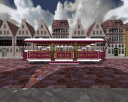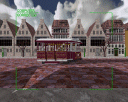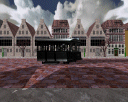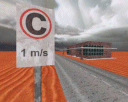Relativistic Ray Tracing
Frederick Akalin
The goal of this project is to extend the pbrt renderer to handle special
relativity. That is, the velocities of the camera and the objects in the scene
will be taken into account when ray-tracing.
Whether this project falls under the heading of physically-based rendering is
debatable; on one hand, special relativity provides a more accurate physical
model of the world, yet on the other hand it is unlikely that, aside from the
relativistic doppler shifting of objects in space, one will be able to see the
more exotic effects predicted by relativity, like length contraction, in real
life. However, since one would not be able to see relativistic effects in real
life, it would be interesting for a program to be able to render such scenes,
and perhaps useful to gain an intuition for relativity.
A more practical reason for picking this project is that it is easily
adaptable to difficulty or time constraints; there are many independent
relativistic effects that can be implemented, like the velocity of the camera,
the velocity of the objects, Terrel rotation, relativistic abberation, and
relativistic doppler shift. Therefore it is almost guaranteed that I will have
something to show at the end of the quarter, even if it is a relatively (no pun
intended) simple effect.
The main technical challenge would be to gain enough familiarity with the
pbrt system to be able to modify it to handle relativity. For starters, instead
of light rays in 3-d space, light rays in 4-d space-time would have to be
ray-traced instead. Some of the more low-level aspects of pbrt, which we haven't
studied in detail, would have to be modified. Also, understanding the
mathematics behind relativity--that is, the modern 4-d formalism--would be
non-trivial.
The main paper I will use for reference (at least in the beginning) is Relativistic
ray-tracing: simulating the visual appearance of rapidly moving objects. It
describes the extended model which takes into account the motion of the camera.
If this is not challenging enough, this page provides more
examples of effects to render, and the accompanying paper
describes some of the effects of relativity. A possible plan after the above has
been implemented would be: 1) take into account the motion of the objects; 2)
implement relativistic abberation; 3) and implement relativistic doppler shift.
Below are some images from the abovementioned site which demonstrates
relativistic effects. (Shamelessly leeched from the original site, but only a
few people are going to see this.)
 |
 |
 |
| Static |
 | A tram at rest. |
| Warped |
 | A tram in motion appears to be Terrel rotated, or equivalently,
shortened and sheared. |
| Darkened |
 | With all relativistic effects visible, the light from the tram is
Doppler-shifted to higher frequencies (blueshifted) and darkened due to
time dilation and geometrical effects. |
 |
 |
 |
| Newton |
 | A desert highway scene. |
| +Aberration |
 | The scene corrected for aberration at 0.76c. |
| +Doppler |
 | The scene corrected for aberration and Doppler shift. |
 |
 |
 |
| +Intensity |
 | The scene with all relativistic effects, including head-lighting /
intensity effects. |
| Terrel Rotation |
 | A Terrel-rotated cube. |
| Static |
 | Flying inside a cube at 0.99c. |
 |
 |
 |
| Earth |
 | Objects that present a circular outline, like the Earth, present a
circular outline regardless of velocity - but can still appear
distorted. |
| Starfield |
 | The starfield appears bunched and is Doppler shifted. |
| Speed Limit |
 | A close-up of the speed
sign. |











